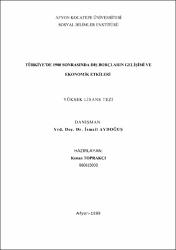| dc.contributor.author | Kenan TOPRAKÇI | |
| dc.date.accessioned | 2019-03-08T14:12:35Z | |
| dc.date.available | 2019-03-08T14:12:35Z | |
| dc.date.issued | 1999 | |
| dc.date.submitted | 1999 | |
| dc.identifier.uri | http://hdl.handle.net/11630/5507 | |
| dc.description.abstract | Günümüzde, Gelişmekte Olan Ülkelerin Gelişmiş Ülkelerin Gelişmiş Ülkelerden Borçlanması, esas olarak kalkınmış ülkeler seviyesine ulaşabilmek için gerekli yatırımlarını finanse edecek yabancı sermayeye muhtaç olmalarından ileri gelmektedir.
Dış borçlanmanın temelinde genellikle, yurtiçi tasarrufların yeterli düzeyde olmamasıdır. Bu durum az gelişmiş ülkelerde süreklilik gösteren bir problemdir. Ödemeler dengesi açıklarını kapatma veya büyüme ve istihdam gibi amaçlara ulaşmak için alınan dış krediler amacına uygun kullanıldığı takdirde olumlu etki yaratmaktadır.
Bu bağlamda, ülkemizde 1980’lerden sonra gerek tasarruf açığı gerekse dış ticaret açığı nedeniyle dış kaynaklara başvurulmak zorunda kalınmıştır.
Bu çalışma üç bölümden oluşmuştur. Birinci bölüm : Bir bütün olarak Dış borcun tanımı kavramları üzerinde durulmuştur. İkinci bölüm: Türkiye’de dış borçların nedenleri ve tarihsel gelişimi üzerinde durulmuştur. Genel çerçevede olmak kaydıyla Ekonominin Genel Dengesi Ve Ödemeler Dengesi Üzerine Etkileri Makro Açıdan Radyolarla Analiz edilmiştir. Üçüncü bölüm; Dış borçların Türkiye ekonomisine etkileri makro açıdan analiz edilmiştir. | en_US |
| dc.description.abstract | İn general, borrowing of less developed countries from the developed ones comes from their need of foneing copital to finance thenecessory investment ın order to reach the level of the developed countries.
The main reason for the external indebttedness ıs the lack of edequate level of internal savings. This ıs a permonent problem of less developed countries. Fo reing eredits enacted to coverthe balonce of payments deficits or to ensure full employment and economic growht ıf used properly, will have positive effects.
In this context foreing dept has an impact on general equilibrium ofeconomy and bolonce of poyments. İn our countruy, the need has arised far fareing borrowing post 1980’s to finanse both the saving gop and trade deficit.
The study consists of three parts. İn the first section; as a whole ofter thedescription of external depts and its.Related concepts are given, in the second part, Turkish reasons and historical development of external debts were studied ina general frome work, analized the impact of external debt with vorious ration on general equilibrium of economy. The third port analized the impoct of external debt with warious rations on general ef economy in the Turkey. | en_US |
| dc.language.iso | tur | en_US |
| dc.publisher | Afyon Kocatepe Üniversitesi Sosyal Bilimler Enstitüsü | en_US |
| dc.rights | info:eu-repo/semantics/openAccess | en_US |
| dc.subject | Günümüzde, Gelişmekte Olan Ülkelerin Gelişmiş Ülkelerin Gelişmiş Ülkelerden Borçlanması | en_US |
| dc.subject | Ekonominin Genel Dengesi Ve Ödemeler Dengesi Üzerine Etkileri Makro Açıdan Radyolarla Analizi | en_US |
| dc.title | Türkiye’de 1980 Sonrasında Dış Borçların Gelişimi Ve Ekonomik Etkileri | en_US |
| dc.title.alternative | Development of the External Debt And in Turkey after 1980 Economic Effects | en_US |
| dc.type | masterThesis | en_US |
| dc.department | Afyon Kocatepe Üniversitesi, Sosyal Bilimler Esntitüsü | en_US |
| dc.relation.publicationcategory | Tez | en_US |



















